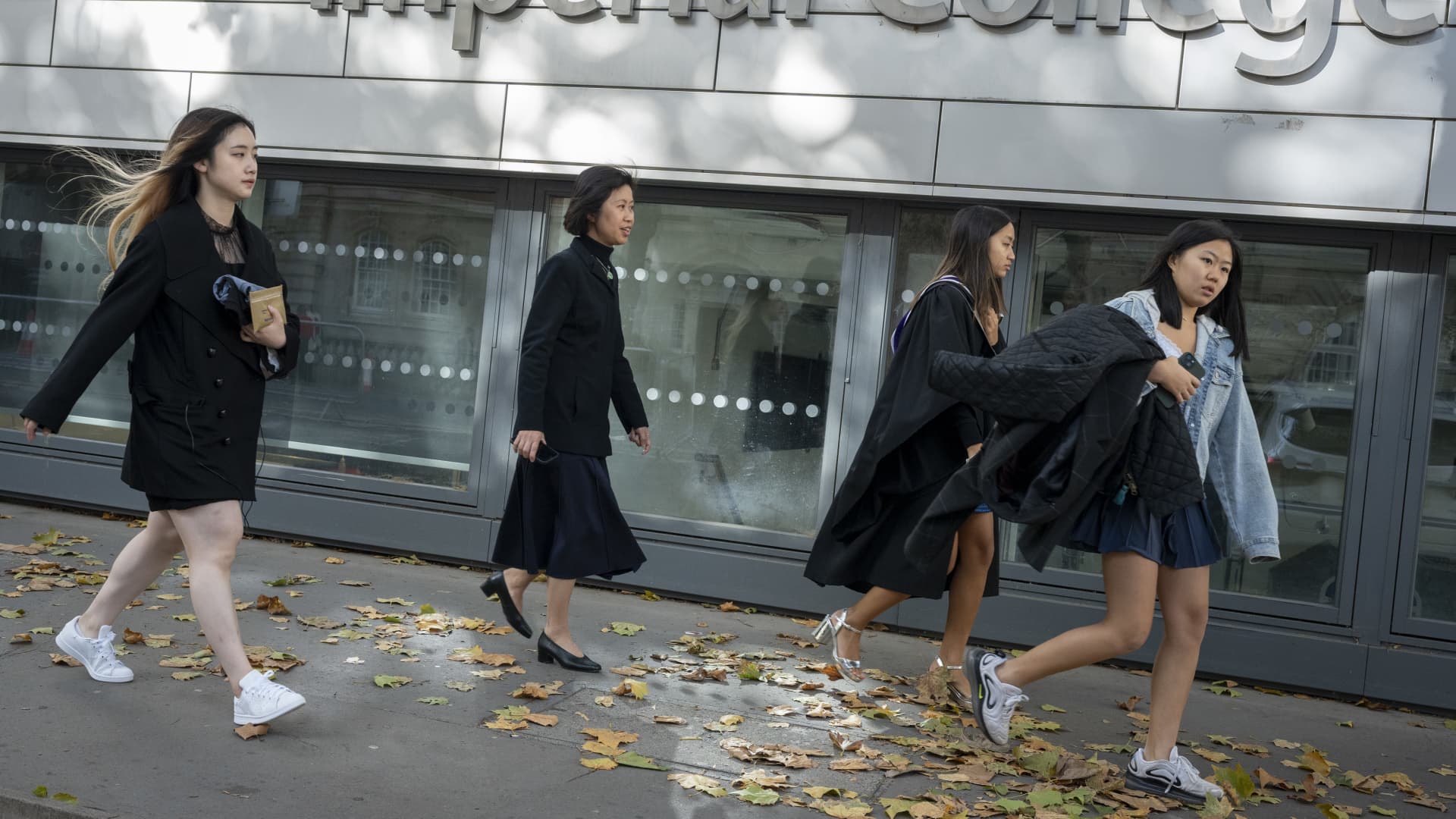Young graduates from Imperial College London at their graduation ceremony, on 19th October 2022 in London, England.
Richard Baker | In Pictures | Getty Images
British universities are preparing to attract international Chinese students after President Donald Trump’s administration cracked down on visas for Chinese students studying in the U.S.
U.S. Secretary of State Marco Rubio said in a statement Wednesday that the U.S. will start “aggressively” revoking visas for Chinese students in the U.S., including those with connections to the Chinese Communist Party, in efforts to curb immigration.
It comes after the Trump administration also blocked Harvard University’s ability to enroll or retain international students, accusing the elite Ivy League institution of “coordinating with the Chinese Communist Party on its campus.”
U.K. universities are now set to profit as they snatch up Chinese students who have been disrupted by this development and are likely to pivot from the U.S. to other study destinations, according to Sankar Sivarajah, head of Kingston Business School.
Sivarajah said the U.S. policy is “disappointing” and “not forward-looking” at a time when higher education institutions should be fostering more diverse talents and perspectives.
The total number of international Chinese students at higher education institutions in the U.K. in the 2023 to 2024 academic year came to 149,885, according to the latest figures from the Higher Education Statistics Agency. This was down from 154,260 in the previous academic year, and 151,700 in the 2021 to 2022 academic year.
However, change is underway as a Knight Frank analysis of UCAS’s January 2025 Cycle Application found an 8.9% surge in Chinese international student applications, with 31,160 applicants from China by January 2025 compared to 28,620 at the same time last year.
The U.K. is an attractive study destination for international Chinese students amongst competitors like the U.S., Canada, and Australia, Sivarajah said. It’s appeal is rooted in shorter degree durations, affordable living costs, and global recognition.
“These are quite attractive factors in general for the U.K. being a destination of choice for higher education and the current post-study work opportunities as well places the U.K. at a forefront to seize this opportunity,” Sivarajah said.
‘A slow decline’
André Spicer, executive dean at Bayes Business School, said on CNBC’s “Squawk Box Europe” that there’s been a “slow decline in the number of U.S. institutions which are in the top 100,” and it comes down to international institutions upping their game, including in Europe.
“So here in the U.K., we’ve sort of held our own, so if you get on a LimeBike from here ride 10 to 15 minutes, you’re going to find a bunch of globally, leading institutions, leading business schools like my own, like Imperial like London Business School,” Spicer said Friday. “So, we’re one of the highest concentrations of fantastic business schools, but also great universities in Europe.”
British universities are also heavily reliant on funding from international students because undergraduate fees for domestic students are a “loss-making product,” as the tuition fee is frozen and hasn’t kept up with inflation, Sivarajah said.
“So to fund higher education, the model in the U.K. is that universities really rely on international student funding to make sure that they’re financially sustainable … International student funding is quite crucial for the U.K. University’s financial sustainability.”
Chinese students bring in about £5.5 billion ($7.4 billion) in fees across 158 U.K. universities, according to a recent Telegraph analysis. The British newspaper found that 21 universities rely on students from China for at least a tenth of their income, including the Royal College of Art, University College London and the University of Manchester.
Michael Spence, UCL president and provost, said in a statement to CNBC that it highly values its international students.
“International students bring far-reaching economic, social, and cultural benefits to the UK, and we remain dedicated to welcoming the brightest and the best to study with us now and in the future,” Spence said.
‘Increase in strategic level partnerships’
With many students set to begin the academic year in September, British universities will be ramping up efforts to make studying in the U.K. more attractive for Chinese students, including creating initiatives with Chinese institutions.
“There might be an increase in the number of strategic level partnerships, working with Chinese institutions to build that so it’s not a short term but a long-term look at how they can build that bridge,” Sivarajah said.
This includes pushing schemes such as 2 + 1 articulation programs where students are able to begin their studies in China for two years and complete the final year in the U.K. Other avenues to attract talent include offering financial incentives such as scholarships, Sivarajah added.
Bayes Business School’s Spicer pointed out that there are long-term benefits to Chinese students pivoting to the U.K. including growth of the European startup ecosystem.
“There’s some economic research which came out last year which showed that the larger percentage of high growth startups in the U.S. are founded by basically foreign nationals who had gone to U.S. universities, either in engineering, sometimes in business schools,” Spicer said.
“Now the question is that, if we can attract that talent here, use the ecosystems that we have in places like London, places like Berlin, places like Paris, to kind of boost those high growth startups, it’s certainly going to benefit,” he added.





